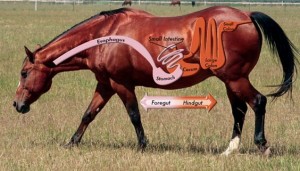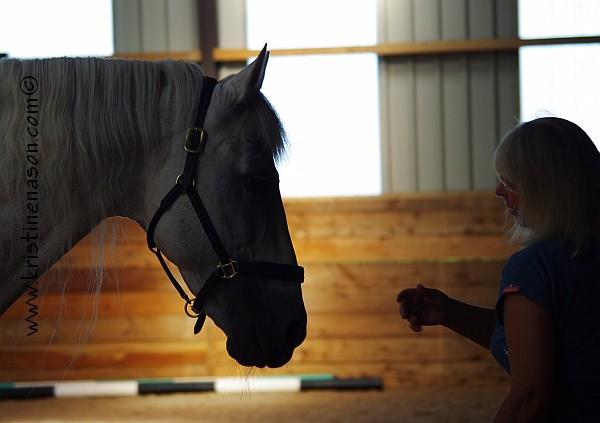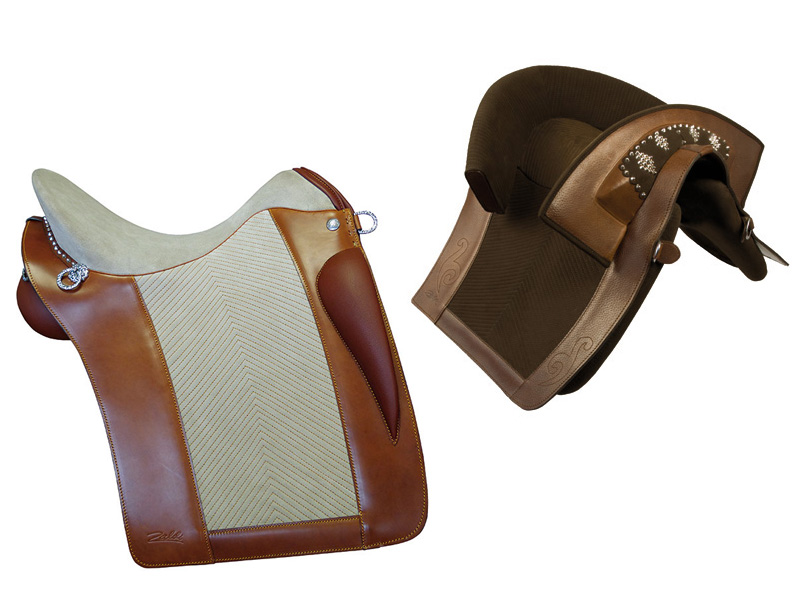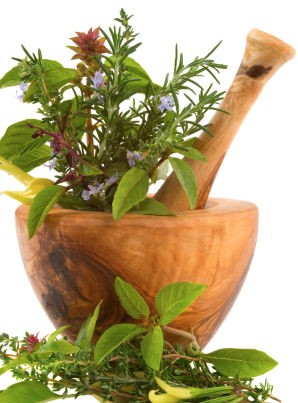
Preventing Colic Naturally
Preventing Colic Naturally

Colic in horses is one of the most feared of conditions because of the dramatic way colic can spiral downward into a life threatening condition so quickly. Most horse owners have experienced at one time or another their beloved horses colicing- usually the vet is called out, the horse given a paraffin drench or an anti spasmodic, the horse is walked around until he passes manure and is eating and drinking with good gut noises being heard – everyone breaths a big sigh of relief and no one is really the wiser as to what caused the problem. Usually the horse Is wormed again just to make sure. (a practice I am against after trauma to the GIT- there are other ways!)
Obstructive colic’s are naturally the worst and scariest to deal with because, as illustrated in the above scenario, we have no way of knowing what the causal factor is unless the horse dies and an autopsy is performed. Usually you will find an enterolith ( preventable with a herbal detoxing) , or compacted dry roughage and necrotic tissue ( because the gut had been deprived of blood supply for a few days leading up to the fatal colic) tumours or foreign items that have inadvertently ended up in the horses GIT. Worm damage (particularly form bots) is another cause. A twisted bowel or telescopic bowel is often what ends the horse’s life, as it’s very difficult to correct these problems once the situation has turned from bad to worse…
 Most colic events are usually from poorly designed diets or management .Overly anxious horses are at risk in certain circumstances because they can stop eating and drinking for significant periods, which creates opportunities for feed to be ingested with minimal fluid causing compactions of feed as it is too dry to pass through the GIT easily.
Most colic events are usually from poorly designed diets or management .Overly anxious horses are at risk in certain circumstances because they can stop eating and drinking for significant periods, which creates opportunities for feed to be ingested with minimal fluid causing compactions of feed as it is too dry to pass through the GIT easily.
Greedy horses can do the same as they can gulp down feeds into a nervous and tight gut, the same outcome of pain and spasm occurring. Horse with a history of digestive upsets are also at risk.
Prevention is the best cure:
A well designed natural whole food diet with natural foraging is the best. Herbal support is advised for the anxious horses (particularly chamomile – a natural anti spasmodic and aids a comfortable peristalsis) and horses that are prone to general digestive upsets. Make sure hay is palatable and able to be chewed up well, checking your horse’s teeth helps in this processing.
Magnesium is a good supplement to give regularly.
Keeping the gut filled with appropriate roughage and water is essential. Fasting can be very dangerous in some situations, and a horse should never be without out food or water for more than 12 hours.
Stress
Competition and Travel Stress creates the highest risk- so measures must be taken to ensure that your horse’s diet during travel and water intake is kept up. Again chamomile and nervous system herbs are ideal, as well as the Bach flower rescue remedy is very useful.
I have also found that therapeutic touch- like T-Touch and Bowen therapy, very useful when dealing with the overly anxious and hyper-vigilant horse.
At Home always have handy the following Herbal Formulas and Bach remedies.
Chamomile flowers- to be given as a tea
Rescue Remedy – can be added to the tea and aids with shock and stress.
McDowell’s Nervous Episode Tonic- contains the herbs Valerian and Zysiphus.
McDowell’s Travel Mix – for long distance protection from Travel sickness and stress
Prevention Treatment Programs for at Risk horses
The Conditioning Blend will help to create metabolic harmony and help your horse’s digestive system and balance his metabolism. This mixture is the primary rehabilitation tonic for horses which have suffered a major health breakdown, been poisoned, bitten by a snake or have, for other reasons, developed liver or kidney damage or are recovering from a major illness, surgery or accident. The Conditioning Blend calms the system and improves liver function allowing your horse to more effectively process foods.
The Conditioning Blend includes the following:- Borage Herb, Chamomile Flowers, Dandelion Leaf, Dandelion Root Extract, Fennel Seeds, Garlic Extract, Hawthorn Berry Extract, Kelp Granules, Nettle Herb, along with the Bach Flowers Olive, Rescue Remedy, Scleranthus and Walnut.
Worming without poisons means your horses and their digestive systems are in better shape and they will therefore be healthier and able to perform better.
My herbal worming treatment utilizes bitter and astringent herbs which work to tone up the gut wall and expel worms, leaving the gut in better condition to manage its own parasite population.
The worming mix includes Cider Vinegar, Fresh Garlic, Fresh Wormwood Leaves and the Bach Flower Crab Apple.
The damage done to the gut and the metabolism as a whole with the routine use of chemical wormers to try to maintain a zero worm load, leaves the animal less healthy in the long run than one with a healthy gut and a small natural worm load.
Nervous Rehabilitation as a good basic place to start with.
This cider vinegar extract is formulated to nourish and calm the nervous disposition. It contains ‘Nervines’ or nervous system tonics to allow change to a nervy horse’s nature and habit patterns of reaction to certain circumstances.
Your horse will become much calmer and more confident under stress and will return to form more quickly after competition.
The mix includes:- Borage, Kelp, Mistletoe, Skullcap, Vervain, Valerian and Wild Lettuce along with the Bach Flowers Aspen, Cerrato, Cherry Plum, Mimulus, Larch, Rock Rose and Rescue Remedy.
The results are quickly seen and are sustainable.
After a short time on the full dose, the your horse may be weaned down to a single dose daily and often, after a full 12 weeks course, can be taken off the mix altogether.
This treatment will save your investment in an animal which cannot produce its best due to an overly sensitive nervous disposition.
This regimen is given during 48 hours prior to an event by mixing the dose with other treatments or water and syringing over the tongue.
This tonic is used, as the name suggests, and is administered to a horse that reacts to a particular event or episode but is generally well behaved in normal situations.
My first approach is always to try to resolve the problem with the Nervous System Rehabilitation tonic and only go to the Episode Tonic when the former is not enough for competition day.
The mix consists of a concentrated extract of Zisyphus Spinoso along with the Bach Flowers Aspen, Cerrato, Cherry Plum, Mimulus, Larch, Rock Rose and Rescue Remedy.
The treatment is administered 48 hours prior to the particular circumstance e.g. showground, enclosed arena, barrier or racetrack etc, and then reduced to 24 hours prior and then to the day of the event, as we get improvements.
In conclusion, whilst we can’t protect our horses from unforseen reasons for colic (we cant always know a tumour is brewing) or eliminate the need for a vet, we can, however, do our best to keep our horses digestive systems and nervous systems healthy with a whole food, natural diet and good management practices, minimising the risk of possible colic.
I have been involved with and cared for over 40 horses personally, and I have only ever had two horses colic- I suspect that for both, reasons were due to changes in diet and season, but I will never know, because it has never happened again. I took steps to ensure that both these horses were out of the high risk group.
Catherine McDowell
Herbalist





